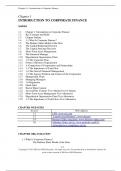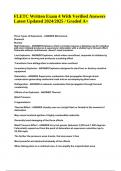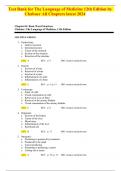Exam (elaborations)
SOLUTION MANUAL For Corporate Finance 13th Edition ByStephen Ross, Stephen A. Ross, Randolph W.. Westerfield, Jeffrey F.. Jaffe, Bradford D.. Jordan | All Chapters | Newest Version 2024
- Course
- Institution
- Book
SOLUTION MANUAL For Corporate Finance 13th Edition ByStephen Ross, Stephen A. Ross, Randolph W.. Westerfield, Jeffrey F.. Jaffe, Bradford D.. Jordan | All Chapters | Newest Version 2024 Chapter 01 - Introduction to Corporate Finance 1-1 Copyright © 2023 McGraw-Hill Education. All rights reserve...
[Show more]












